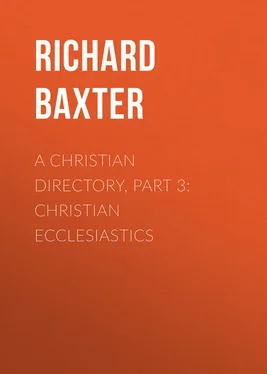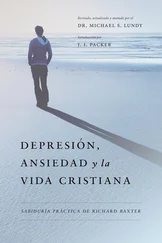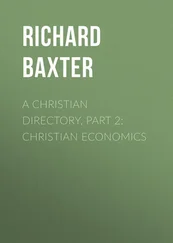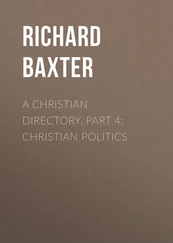Richard Baxter - A Christian Directory, Part 3 - Christian Ecclesiastics
Здесь есть возможность читать онлайн «Richard Baxter - A Christian Directory, Part 3 - Christian Ecclesiastics» — ознакомительный отрывок электронной книги совершенно бесплатно, а после прочтения отрывка купить полную версию. В некоторых случаях можно слушать аудио, скачать через торрент в формате fb2 и присутствует краткое содержание. Жанр: foreign_antique, foreign_prose, на английском языке. Описание произведения, (предисловие) а так же отзывы посетителей доступны на портале библиотеки ЛибКат.
- Название:A Christian Directory, Part 3: Christian Ecclesiastics
- Автор:
- Жанр:
- Год:неизвестен
- ISBN:нет данных
- Рейтинг книги:3 / 5. Голосов: 1
-
Избранное:Добавить в избранное
- Отзывы:
-
Ваша оценка:
- 60
- 1
- 2
- 3
- 4
- 5
A Christian Directory, Part 3: Christian Ecclesiastics: краткое содержание, описание и аннотация
Предлагаем к чтению аннотацию, описание, краткое содержание или предисловие (зависит от того, что написал сам автор книги «A Christian Directory, Part 3: Christian Ecclesiastics»). Если вы не нашли необходимую информацию о книге — напишите в комментариях, мы постараемся отыскать её.
A Christian Directory, Part 3: Christian Ecclesiastics — читать онлайн ознакомительный отрывок
Ниже представлен текст книги, разбитый по страницам. Система сохранения места последней прочитанной страницы, позволяет с удобством читать онлайн бесплатно книгу «A Christian Directory, Part 3: Christian Ecclesiastics», без необходимости каждый раз заново искать на чём Вы остановились. Поставьте закладку, и сможете в любой момент перейти на страницу, на которой закончили чтение.
Интервал:
Закладка:
Quest. I. What is moral goodness in any creature and subject, but a conformity to his ruler's will expressed in his law? And if this conformity be its very form and being, it cannot be that any thing should be morally good that is not commanded.
Quest. II. Doth not the law of God command us to love him with all our heart, and soul, and strength, and accordingly to serve him? And is it possible to give him more than all; or can God come after and counsel us to give him more than is possible?
Quest. III. Doth not the law of nature oblige us to serve God to the utmost of our power? He that denieth it, is become unnatural, and must deny God to be God, or deny himself to be his rational creature: for nothing is more clear in nature, than that the creature who is nothing, and hath nothing but from God, and is absolutely his own, doth owe him all that he is able to do.
Quest. IV. Doth not Christ determine the case to his disciples, Luke xvii. 10?
A middle between good and evil in morality is a contradiction: there is no such thing; for good and evil are the whole of morality: without these species there is no morality.
Object. II. It seems then you hold that there is nothing indifferent, which is a paradox.
Whether any things be indifferent?
Answ. No such matter: there are thousands and millions of things that are indifferent; but they are things natural only, and not things moral. They are indifferent as to moral good and evil, because they are neither; but they are not indifferentia moralia : the indifferency is a negation of any morality in them in genere , as well as of both the species of morality. 50 50 Stoici indifferentia distinguunt: 1. Ea quæ neque ad fœlicitatem neque ad infœlicitatem conferunt, ut sunt divitiæ, sanitas, vires, gloria, &c. Nam et sine his contingit fœlicem esse; cum earum usus vel rectus fœlicitatis, vel pravus infœlicitatis, author sit. 2. Quæ neque appetitum neque occasionem movent, ut pares vel impares habere capillos, &c. Laert. in Zenone.
Whatsoever participateth not of virtue or vice, and is not eligible or refusable by a moral agent as such, hath no morality in it. There may be two words so equal as it may be indifferent which you speak; and two eggs so equal, as that it may be indifferent which you eat; but that is no more than to say, the choosing of one before the other is not actus moralis : there is no matter of morality in the choice.
Object. III. But if there may be things natural that are indifferent, why not things moral?
Answ. As goodness is convertible with entity, there is no natural being but is good: as goodness signifieth commodity, there is nothing but is profitable or hurtful, and that is good to one that is hurtful to another: but if it were not so, yet such goodness or badness is but accidental to natural being; but moral goodness and badness is the whole essence of morality.
Object. IV. But doth not the apostle say, "He that marrieth doth well, and he that marrieth not doth better?" Therefore all is not sin which is not best.
Whether marrying be indifferent?
Answ. The question put to the apostle to decide, was about marrying or not marrying, as it belonged to all christians in general, and not as it belonged to this or that individual person by some special reason differently from others. And so in respect to the church in general, the apostle determineth that there is no law binding them to marry, or not to marry: for a law that is made for many must be suited to what is common to those many. Now marriage being good for one and not for another, is not made the matter of a common law, nor is it fit to be so, and so far is left indifferent: but because that to most it was rather a hinderance to good in those times of the church, than a help, therefore for the present necessity, the apostle calleth marrying "doing well," because it was not against any universal law, and it was a state that was suitable to some; but he calls not marrying "doing better," because it was then more ordinarily suited to the ends of christianity. Now God maketh not a distinct law for every individual person in the church; but one universal law for all: and this being a thing variable according to the various cases of individual persons, was unfit to be particularly determined by a universal law. But if the question had been only of any one individual person, then the decision would have been thus: though marrying is a thing not directly commanded or forbidden, yet to some it is helpful as to moral ends, to some it is hurtful, and to some it is so equal or indifferent, that it is neither discernibly helpful nor hurtful; now by the general laws or rules of Scripture to them that consideratis considerandis it is discernibly helpful, it is not indifferent, but a duty; to them that it is discernibly hurtful, it is not indifferent, but a sin; to them that it is neither discernibly helpful or hurtful as to moral ends, it is indifferent, as being neither duty nor sin; for it is not a thing of moral choice or nature at all. But the light of nature telleth us that God hath not left it indifferent to men to hinder themselves or to help themselves as to moral ends; else why pray we, "Lead us not into temptation?" And marriage is so great a help to some, and so great a hurt to others, that no man can say that it is morally indifferent to all men in the world: and therefore that being none of the apostle's meaning, it followeth that his meaning is as aforesaid.
Object. V. But there are many things indifferent in themselves, though not as clothed with all their accidents and circumstances: and these actions being good in their accidents, may be the matter of a vow.
Answ. True, but those actions are commanded duties, and not things indifferent as so circumstantiated. It is very few actions in the world that are made simply duties or sins, in their simple nature without their circumstances and accidents: the commonest matter of all God's laws, is actions or dispositions which are good or evil in their circumstances and accidents. Therefore I conclude, things wholly indifferent are not to be vowed.
Direct. V. It is not every duty that is the matter of a lawful vow. Else you might have as many vows as duties: every good thought, and word, and deed might have a vow. And then every sin which you commit would be accompanied and aggravated with the guilt of perjury. And no wise man would run his soul into such a snare. Object. But do we not in baptism vow obedience to God? And doth not obedience contain every particular duty? Answ. We vow sincere obedience, but not perfect obedience. We do not vow that we will never sin, nor neglect a duty (nor ought we to do so). So that as sincere obedience respecteth every known duty as that which we shall practise in the bent of our lives, but not in perfect constancy or degree, so far our vow in baptism hath respect to all known duties, but no further.
Direct. VI. To make a vow lawful, besides the goodness of the thing which we vow, there must be a rational, discernible probability, that the act of vowing it will do more good than hurt; and this to a wise, foreseeing judgment. For this vowing is not an ordinary worship to be offered to God (except the baptismal vow, renewed in the Lord's supper and at other seasons); but it is left as an extraordinary means, for certain ends, which cannot by ordinary means be attained: and therefore we must discern the season, by discerning the necessity or usefulness of it. Swearing is a part of the service of God, but not of his daily worship, nor frequently and rashly to be used, by any that would not be held guilty of taking the name of God in vain: and so it is in the case of vowing. Therefore he that will make a lawful vow, must see beforehand, what is the probable benefit of it, and what is the probable hurt or danger: and without this foresight it must be rash, and cannot be lawful. And therefore no one can make a lawful vow, but wise, foreseeing persons, and those that advise with such, and are guided by them, if they be not such themselves; unless in a case where God hath prescribed by his own determining commands (as in the covenant of christianity). Therefore to one man the same vow may be a sin, that to another may be a duty; because one may have more reason for it, or necessity of it, and less danger by it, than another. One man may foresee that vowing (in case where there is no necessity) may insnare him either in perplexing doubts, or terrors, which will make all his life after more irregular or uncomfortable. Another man may discern that he is liable to no such danger. 51 51 Plutarch. Quest. Roman. 44. Why may not priests swear? Resp. Is it because an oath put to free-born men, is as it were the rack and torture offered them? For certain it is that the soul as well as the body of the priest, ought to continue free, and not to be forced by any torture. Or that we must not distrust them in small matters, who are to be believed in great and divine things? Or because the peril of perjury would reach in common to the whole commonwealth, if a wicked, and ungodly, and forsworn person should have the charge and superintendency of the prayers, vows, and sacrifices made in behalf of the city? Page 866.
Интервал:
Закладка:
Похожие книги на «A Christian Directory, Part 3: Christian Ecclesiastics»
Представляем Вашему вниманию похожие книги на «A Christian Directory, Part 3: Christian Ecclesiastics» списком для выбора. Мы отобрали схожую по названию и смыслу литературу в надежде предоставить читателям больше вариантов отыскать новые, интересные, ещё непрочитанные произведения.
Обсуждение, отзывы о книге «A Christian Directory, Part 3: Christian Ecclesiastics» и просто собственные мнения читателей. Оставьте ваши комментарии, напишите, что Вы думаете о произведении, его смысле или главных героях. Укажите что конкретно понравилось, а что нет, и почему Вы так считаете.












